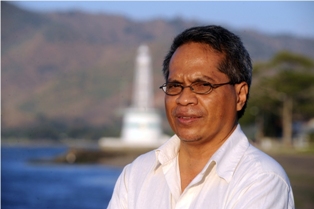Strengthening democracy in Timor-Leste

Addressing the sensitive subject of individual and party interests overriding the national interest
Timor-Leste is one of the world’s newest states and amongst the poorest in Asia (UN Development Report 2011). Nine years after independence, many Timorese are yet to experience the full benefits of democracy and feel out of touch with the democratization process.
Stabilizing the peace: more than just elections
Political crises and cyclical violence continue. Timorese youth feel disenfranchised, rural communities marginalized and there is little public trust in law enforcement institutions. Public accountability is weak and the country is confronted by widespread corruption amid allegations of Government maladministration.
Recognizing the fragility of peace and its future challenges, Timorese are taking every opportunity to move their country forward from post conflict reconstruction to sustainable peace in the consolidation of democracy.
To support the aspirations of the Timorese people, Interpeace and its local partner, the Centre of Studies for Peace and Development (CEPAD) jointly created the Programme for Research and Dialogue for Peace (PRDP) in 2007.
The ‘National Forum,’ which will be held on 25 November 2011 in Dili, is a landmark event for the programme’s second phase. The event will discuss one of the four main obstacles to sustainable peace identified by Timorese: the‘promotion of individual and party interests over the national interest.’
The event will be opened by President of the Republic, Dr. Jose Ramos-Horta and attendees will include representatives from key decision-making institutions including the Executive, Opposition, Judiciary, National Parliament, National Police and Army. For more details see the press release (pdf).
Ideas into action: two recommendations to be put forward for enactment into policy
Following over eight months’ consultative and empirical research by PRPD across Timor-Leste’s 13 districts, two recommendations will be presented at the National Forum for consideration into policy enactment:
‘A permanent civic education campaign’
A permanent civic education campaign will be put forward to address the perceived lack of moral and civic responsibility in Timor-Leste and to promote active and responsible citizenship. “The goal is to develop and promote civic responsibility,” explains João Boavida, Executive Director of CEPAD. “By implementing such a civic education initiative, we will be able to encourage responsible citizenship with the knowledge and skills to support and respect democratic rules and norms,” he continued.
‘An Independent Society of Ethics’
The second recommendation is for the establishment of an ‘Independent Society of Ethics.’ This will provide citizens with the opportunity to discuss and put forward community issues across all government structures in the promotion of active and engaged citizenship. In conjunction with the first recommendation, it is anticipated that this initiative will facilitate and build trust between the government and its people. “... This recommendation is very important ... to help develop this country. Important because to-date, the Government has established various commissions…but there is not yet a positive progress in place,” stated one of the participants in an earlier consultation in the Aileu district.
Key stakeholders will discuss and debate the recommendations at the National Forum in order to enrich their content and identify the actions, and people, required to move the implementation of the recommendations forward.
CEPAD Executive Director João Boavida further explained:
“The objective of the initiative is to bring the collective interest to the forefront...By tackling these areas, we will be able to strengthen democracy in Timor-Leste.”
